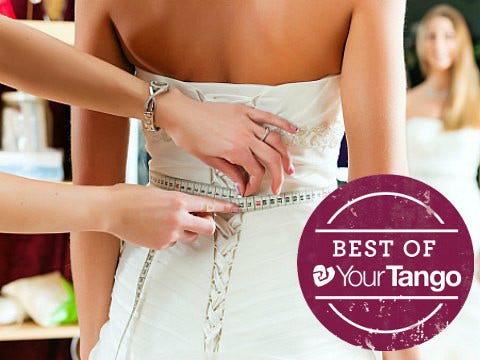I'm Gay — So Can I Have A Traditional Wedding Anyway?
Gay weddings are relatively unprecedented. In the meantime, I'll make my own traditions.

I was never one of those little girls who dreamed of her wedding day. I never 'pretend-married' any of the neighborhood boys — or even the neighborhood girls. As an adult, I’ve only vaguely considered my wedding day. I've thought about what my grandparents' wedding must have looked like: simple, with my grandfather in a suit and his bride-to-be in a white dress, both of them standing nervously in a small Catholic church in front of friends and family.
That’s what I want: an elegant and traditional ceremony. I imagine my future wife in a white dress, bouquets of lilies and guests who have come to see the most important day of our lives. My hope of a traditional wedding, however, ends there. There’s no such thing as a traditional gay wedding ... not yet, anyway.
I remember a phone conversation I had with my mother once, in the aftermath of a close family friend’s nuptials. We were discussing how much we loved the idea of passing out small containers of bubbles and asking wedding guests to blow bubbles as the newlyweds walked out of the church. My mom is definitely the organizer in my family, and I always hoped she’d play a major part in the planning of my wedding.
"We’ll have to do something like that for my wedding," I suggested. There was a brief hesitation on her end, as she slowly said, "We’ll have to be careful when that time comes. Those things can turn out really … cheesy."
True confession: I have never been to a gay wedding. My mother could be right. For all I know, gay weddings might be consumed by glitter bombs and lesbians in rainbow dresses.
When I saw an article on Advocate.com about J. Crew using a gay couple in their weddings section, it gave me a sense of relief. Featured are two men in suits, looking like just a couple of traditional grooms. There was no glitter, rainbows, or shirtless groomsmen. Their wedding was clearly elegant and tasteful.
Slowly, LGBTs are being granted their civil rights across the country. In the last election, Maine, Maryland, and Washington passed gay marriage, making nine states where such marriage is now legal. In fact, we’re now waiting to hear whether the Supreme Court will take on cases against DOMA, the Defense of Marriage Act, which restricts marriage to heterosexual couples only.
More juicy wedding content on YourTango:
- 4 Unusual Skills The Happiest Couples Master Before They Get Married
- Why Do Men Get Married? [VIDEO]
- How Often Married Couples Kiss, According To Research
There isn’t much doubt that marriage will be legal for me in my lifetime. And with all of these steps being taken, I can’t help but consider the questions I have in anticipation of my own wedding day. I want traditional, in the heteronormative sense. But is that possible?
For example, a traditional (heterosexual) wedding might involve five or six bridesmaids. I have several female friends, but most of my close friends are gay men. I’m not a man, so I wouldn’t have groomsmen. Would it be appropriate to have a mix of bridesmaids and bridesmen? Even as I type that, my computer’s spellcheck is telling me “bridesmen” isn’t a word. Would my wedding suddenly turn into a tawdry pride event, simply because I don’t want to exclude my male friends?
Of course, another concern I have is regarding my last name, a common question regarding marriage in the gay community. My stepfather adopted me when I was seven, and my last name means more to me than it would to most people. My last name represents a great struggle in identity, as well as a monument to a man who loved me like I was his biological child, even though I wasn’t. I fought for that last name, as did my family. I’m not ready to give it up. In fact, it’s a name I’d like to give to someone else. My current partner and I have discussed this, and she said she’d like to take my last name. Heterosexual women simply take their marriage certificate to their local Social Security office to make their name change official, rather than applying for a name change within the court system. So, does legal gay marriage make it easier to take a partner’s name?
Because there’s no real precedent for a traditional gay marriage, same-sex couples are left to duplicate the heterosexual marriage if we’re looking for tradition. But what if that model doesn’t fit? While I know I’ll never have a ceremony in a Catholic church -- like my grandparents did -- I know I want a wedding like I saw this week in the J. Crew ad: conventional, elegant, and stylish — glitter and techno music not included.
How long do you think it will take before gay wedding traditions take hold?
